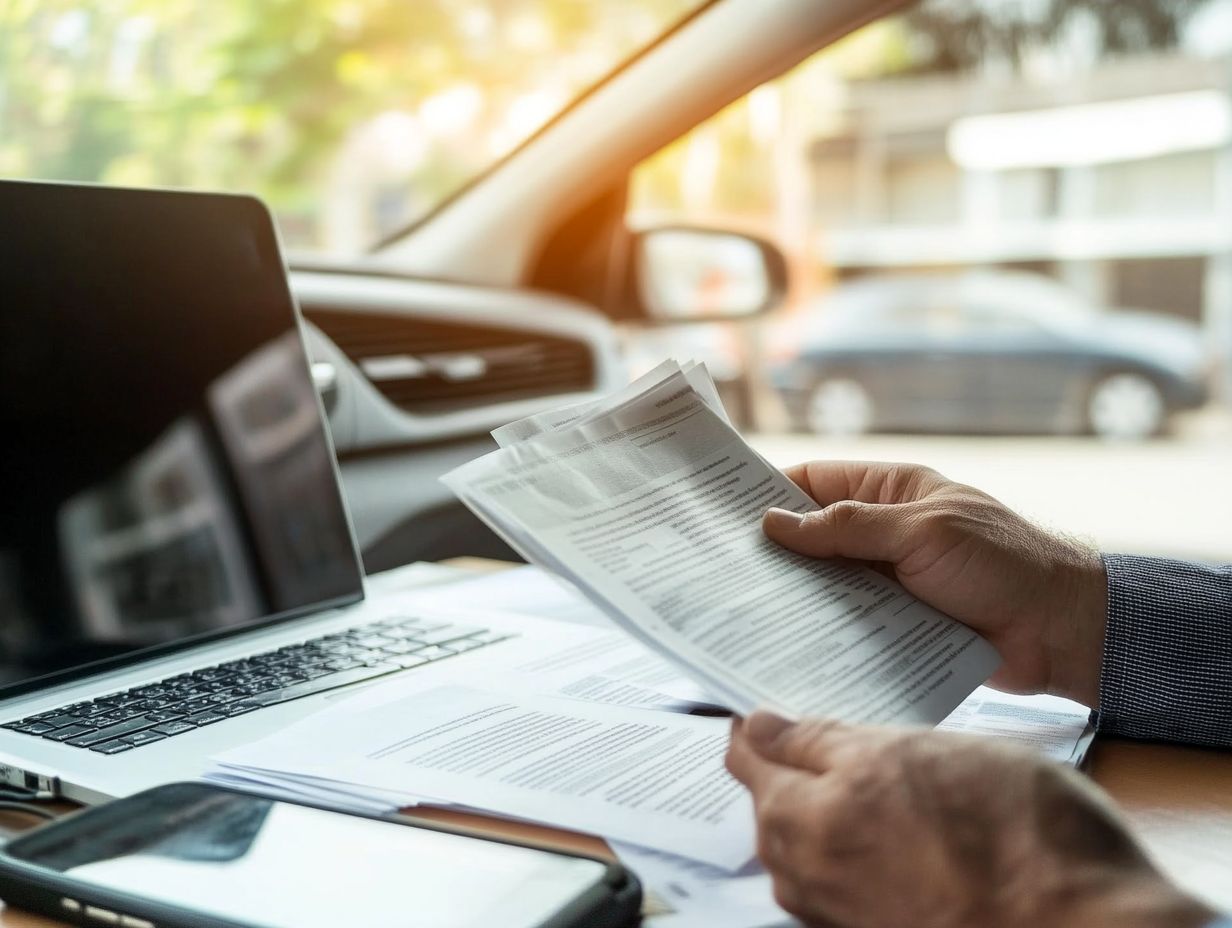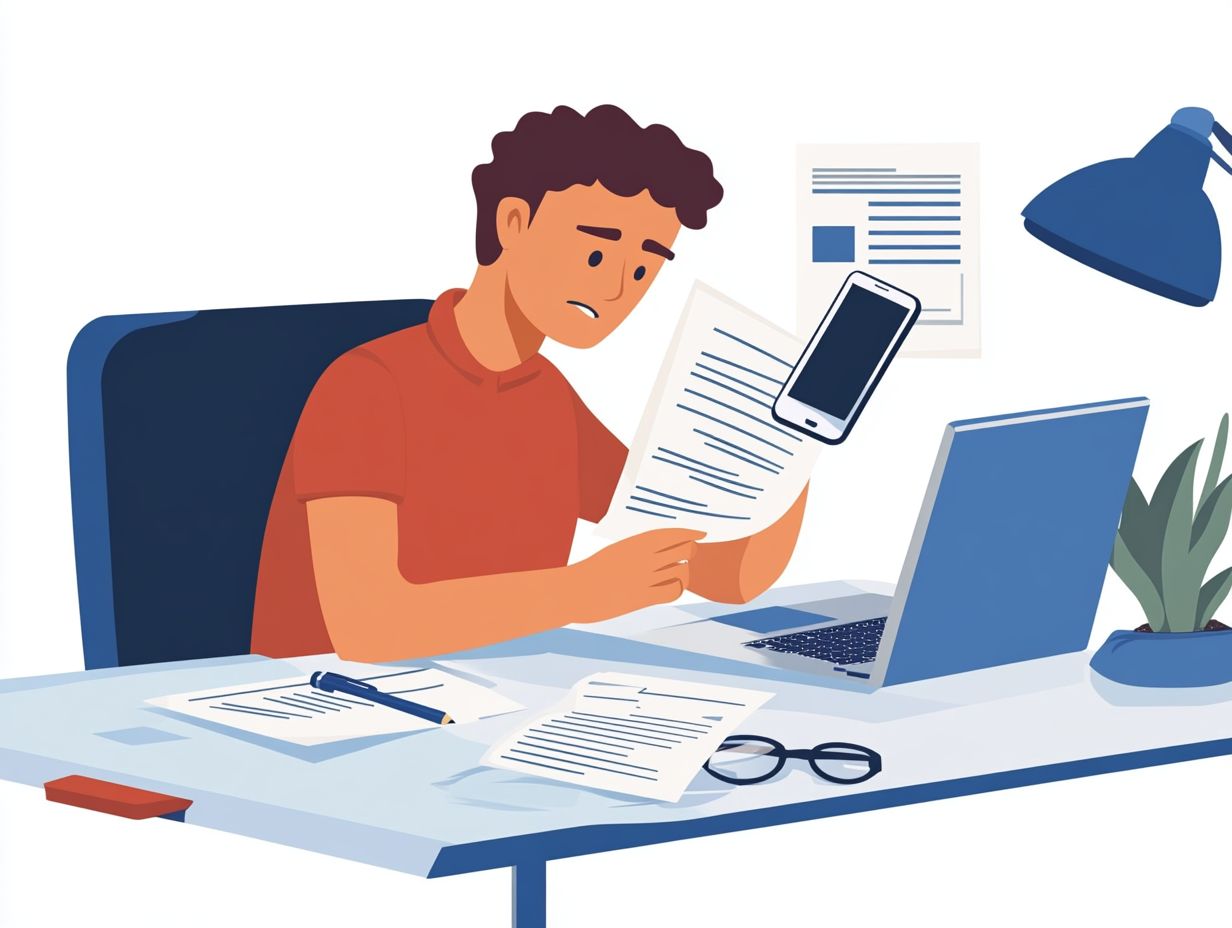How to Avoid Auto Insurance Fraud?
Auto insurance fraud is a significant concern that affects both consumers and insurers. It includes deceptive practices that aim to gain unlawful benefits or payouts.
Fraud can show up in many ways, such as staged accidents or false claims. Recognizing the signs is crucial for every driver.
This article explores different types of auto insurance fraud, highlights red flags to watch for, and offers practical tips for prevention.
If you ever suspect fraud, you ll find guidance here on how to report it effectively. Understanding this issue is crucial to protect yourself and your wallet!
Contents
- Key Takeaways:
- Understanding Auto Insurance Fraud
- Types of Auto Insurance Fraud
- Signs of Auto Insurance Fraud
- Preventing Auto Insurance Fraud
- What to Do if You Suspect Fraud
- Frequently Asked Questions
- What is auto insurance fraud and why should I be concerned about it?
- What are some common types of auto insurance fraud?
- How can I protect myself from becoming a victim of auto insurance fraud?
- What should I do if I suspect someone is committing auto insurance fraud?
- Does my insurance policy cover me in case of auto insurance fraud?
- Can I face legal consequences if I unknowingly commit auto insurance fraud?
Key Takeaways:

Be aware of auto insurance fraud types, like staged accidents and identity theft. Look for red flags such as multiple claims in a short time. For guidance on this, learn how to report fraudulent auto insurance claims. Stay cautious of suspicious offers and always report suspected fraud to the authorities.
Understanding Auto Insurance Fraud
Understanding auto insurance fraud is crucial for you as a policyholder. It involves a range of illegal practices aimed at deceiving insurance companies and manipulating costs.
From staged accidents to fraudulent claims of vehicle damage, scams come in many forms. This deceit not only affects individual policyholders but also raises overall insurance costs, leading to increased insurance costs for honest customers.
According to the National Insurance Crime Bureau (NICB) and experts like Dr. Nikos Passas and Mary-Jo Kranacher, auto insurance fraud is constantly evolving. Staying vigilant and informed is essential to help you avoid these scams.
What is Auto Insurance Fraud?
Auto insurance fraud involves any action taken to deceive an insurance company, often appearing as false claims or exaggerated vehicle damage.
This practice can take various forms. You may encounter staged accidents, where individuals orchestrate incidents to wrongfully claim payouts. Others might submit inflated medical claims that exaggerate treatment costs. Sometimes, policyholders provide misleading information about their vehicle’s condition or use altered documents for higher insurance coverage.
The consequences of fraud are severe. They lead to increased costs for honest policyholders and significant financial strains on insurance companies. As a result, you may face higher premiums, stricter claim investigations, and a general erosion of trust within the industry.
Types of Auto Insurance Fraud
Auto insurance fraud includes numerous schemes. One common tactic is staged accidents, where individuals fabricate collisions to fraudulently claim insurance payouts.
False claims also exist regarding vehicle repairs, along with identity theft targeting unsuspecting insurance policyholders. Each of these forms presents significant challenges, highlighting the need for vigilance in auto insurance.
Staged Accidents
Staged accidents are a major form of auto insurance fraud, where individuals conspire to create fake collisions in order to submit fraudulent claims to insurance companies.
These incidents often involve multiple parties, meticulously coordinated to appear like real accidents. The primary goal is to maximize financial gain through inflated medical expenses and repair costs. Motivations can range from financial desperation to organized crime networks exploiting system vulnerabilities.
The consequences extend beyond immediate criminal charges for those involved. They can lead to higher premiums, a surge in fraud detection measures, and increased scrutiny from insurance investigators.
Statistics show that these scams result in billions in losses each year, prompting insurance companies to adopt stricter policies and collaborate with law enforcement agencies. This effort aims to combat this growing issue and protect legitimate claimants from being caught in the crossfire.
If you suspect fraud, don t hesitate to report it. Your action can make a difference!
False Claims

False claims in auto insurance arise when individuals submit dishonest or exaggerated claims about vehicle repairs, damages, or injuries to secure undeserved compensation from their insurance company.
These misleading submissions can manifest in various ways, such as repair costs that are much higher than the actual expenses or fraudulent medical bills linked to nonexistent injuries.
Such practices strain the insurance system and drive up premiums for honest policyholders. This distortion in claims contributes to rising fraud rates within the industry, complicating matters for legitimate cases that require timely attention.
As a result, consumers bear the brunt of these actions, with insurers increasing prices to offset losses, perpetuating a cycle of deceit that ultimately affects everyone involved.
Identity Theft
Identity theft is a pressing concern in the world of auto insurance fraud. Criminals exploit stolen personal information from unsuspecting policyholders to submit fraudulent claims.
This insidious practice complicates the lives of innocent victims, leading to financial strain and potential legal entanglements, while imposing a heavy burden on the insurance industry.
For example, scammers may fabricate accident reports or claim damages for incidents that never occurred, resulting in substantial financial losses for insurers. This can drive up premiums for honest policyholders, as companies are compelled to raise costs to counteract these risks.
Be aware of common identity theft scams like phishing emails or impersonating fake insurance agents. Take action now! Use credit monitoring to keep an eye on your credit report and employ strong passwords to safeguard your information.
Signs of Auto Insurance Fraud
It’s vital to identify signs of auto insurance fraud quickly to protect your wallet. Recognizing these signs helps mitigate risks and protects against significant financial losses.
Be vigilant for red flags, such as:
- unusually high repair bills.
- inconsistent statements from claimants.
- a noticeable increase in collisions reported in a particular area.
These indicators could signal potential scams that warrant your attention.
Red Flags to Watch Out For
Be on the lookout for common red flags that could signal potential auto insurance fraud. Inconsistencies in reported vehicle damages or an unusually high number of claims from a single individual should raise immediate concerns.
The involvement of suspicious tow truck companies often tied to scams can also trigger alarms. For example, if multiple witnesses offer conflicting accounts of an accident, it might indicate a planned attempt to mislead insurers.
If someone files claims shortly after purchasing a policy, especially for significant damages, this could be a critical warning sign.
It’s essential for everyone engaged in the insurance process to stay vigilant and recognize these indicators. The repercussions of fraudulent activities can extend far beyond monetary losses, impacting premiums and overall trust in the insurance system.
Preventing Auto Insurance Fraud
Preventing auto insurance fraud is crucial for safeguarding both your interests as a policyholder and the integrity of the entire insurance system. Additionally, understanding how to save on auto insurance can further enhance your protection and financial well-being.
By embracing practices like defensive driving, consistently reviewing your insurance policies, and staying informed about prevalent scams, you can effectively protect yourself against fraudulent activities.
Tips for Avoiding Fraudulent Schemes

To stay clear of fraudulent schemes in auto insurance, it’s essential to be informed and adopt specific strategies. Understanding what you should know about auto insurance scams can help you recognize scam alerts and verify the credentials of repair shops.
Regularly review your policy details to fully understand your coverage limits (the maximum amount your insurer will pay) and exclusions (what’s not covered). Stay vigilant about suspicious behaviors, like unusually low estimates from repair shops or unsolicited offers from claims adjusters.
Building a strong line of communication with your insurance company is crucial! Make it a habit to report any anomalies right away. Conduct thorough research on both insurers and repair services to protect your interests and contribute to a culture of transparency in the industry.
What to Do if You Suspect Fraud
If you suspect auto insurance fraud, act fast! Consider reporting your concerns to the relevant authorities, including your insurance company and organizations like the National Insurance Crime Bureau (NICB).
They can assist in investigating fraudulent claims and help protect your interests.
Steps to Take to Report Fraud
Reporting fraud effectively requires a systematic approach. Start by collecting all necessary documentation related to the suspected fraudulent claim. First, contact your insurance company to initiate an investigation.
This initial communication sets the tone for the entire process. Note specific details about the incident, including dates, locations, and any relevant conversations that could substantiate your suspicions. Gather photos or videos that might serve as evidence and document the names of all involved parties.
Once you’ve done that, reaching out to local law enforcement can be beneficial, as they can assist in evidence collection. Timely reporting prevents further losses and contributes to a safer community, underscoring the importance of diligence in addressing potential fraud.
Frequently Asked Questions
What is auto insurance fraud and why should I be concerned about it?
Auto insurance fraud involves deceiving an insurance company for financial gain. It can lead to higher insurance premiums for everyone and may result in legal consequences.
What are some common types of auto insurance fraud?

- Staging car accidents
- Filing false insurance claims
- Providing false information on insurance applications
How can I protect myself from becoming a victim of auto insurance fraud?
To avoid becoming a victim, be cautious of suspicious offers or requests from strangers. Always verify the legitimacy of insurance providers and never sign blank insurance forms or documents!
What should I do if I suspect someone is committing auto insurance fraud?
If you suspect fraud, report it to your insurance company immediately! You can also contact the National Insurance Crime Bureau (NICB) or your state’s insurance fraud bureau for further assistance.
Does my insurance policy cover me in case of auto insurance fraud?
Most policies have provisions that protect against fraud or include coverage for restitution if you become a victim. Review your policy or speak with your insurance agent to be sure.
Can I face legal consequences if I unknowingly commit auto insurance fraud?
In some cases, individuals may unknowingly commit fraud by providing incorrect information on their application. This can lead to serious consequences, such as a denied claim. Always be honest and accurate when providing information to your insurance company!
Take proactive steps to protect yourself from auto insurance fraud!






